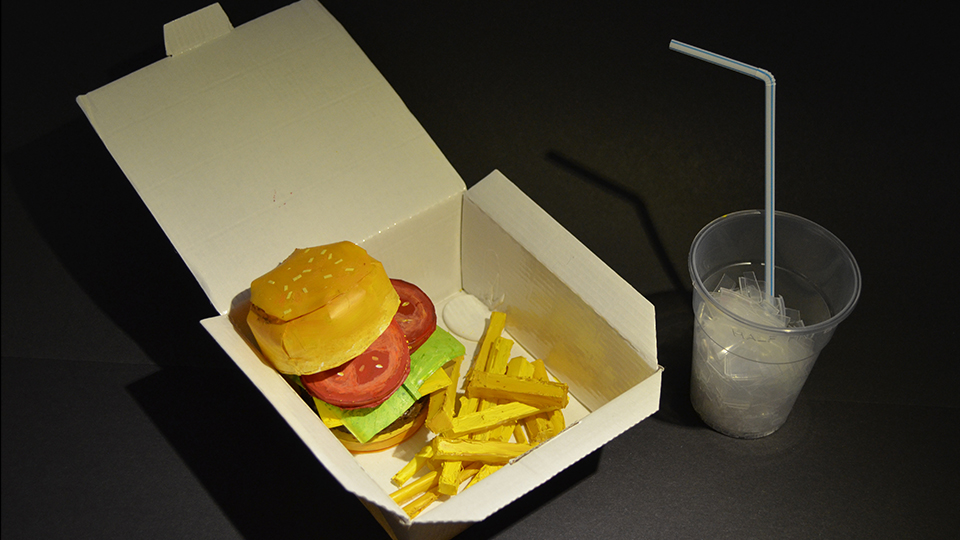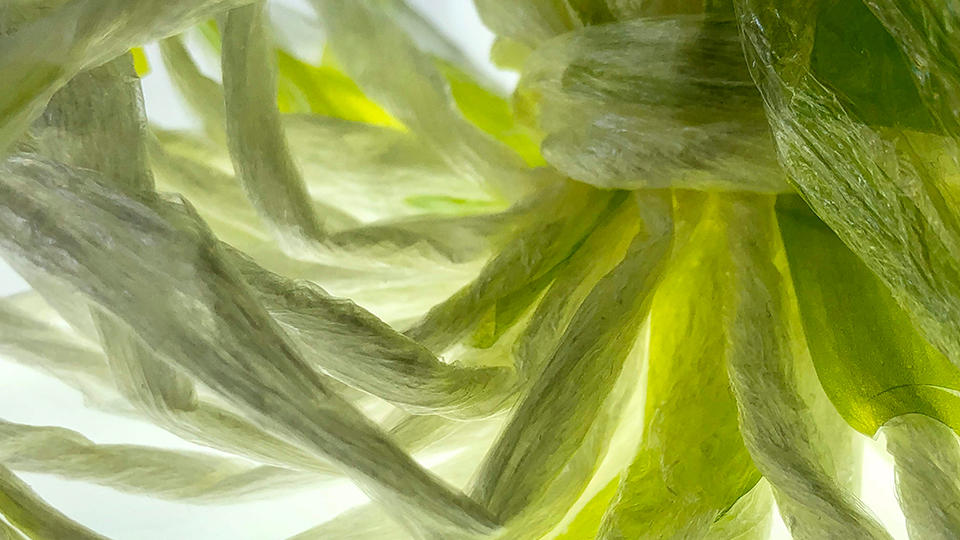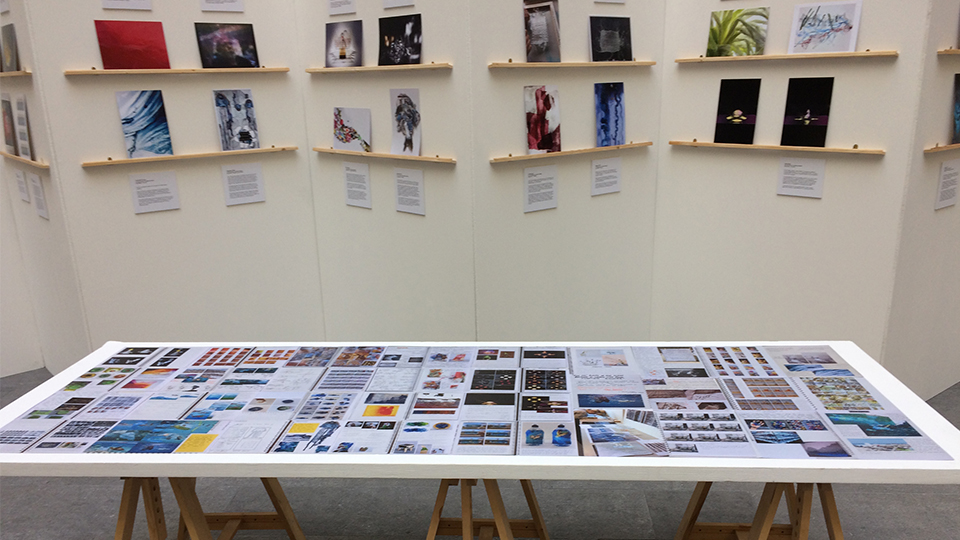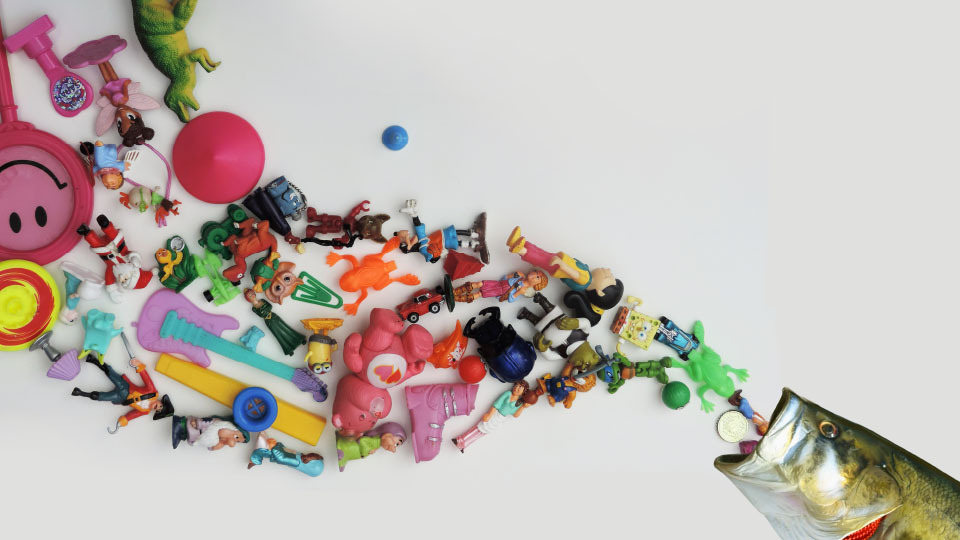Until 24 May, images of works created by Art and Design Foundation students will be showcased at the Department for Environment, Food and Rural Affairs (Defra), in London – and it’s the first plastic themed exhibition to be displayed in the building.
This is the first year the Foundation course has explored using art as a medium to discuss plastic pollution and the idea came after the programme’s Head of Textiles, Yanina Temple, watched a documentary about the impact of waste in the world’s oceans.
Throughout the project, students were required to research into single-use plastic and discuss the positives and negatives of the material.
Both academics and students collected their own plastic waste and brought them in for themselves and their peers to make art from.
One student, Maisie Minors – who specialises in Visual Communications - crafted a burger and chips meal made entirely from recycled plastic cups to illustrate how sea creatures can easily mistake plastic waste in the ocean as food.

Maisie Minors' 'burger and chips', made from recycled plastic cups
Other pieces included a room filled with a maze of black bin liner, which looked to “symbolise the toxic and trapping impact that plastic has on our ecosystems”, a 3D hologram made using a plastic pyramid and a mobile phone screen, and a fish emptying its contents of small, plastic toys.
Many students reported that the project changed their views on single-use plastic and has made them more conscious of the impacts it is having on the earth.
The art created by the students has been photographed and the exhibition will showcase these images alongside their comments and thoughts on the every-growing pollution issue.
Textile student Molly Jackson, who used plastic wrap to mimic seaweed in her piece, said: “My findings were influenced by my research into cling film as a single-use plastic that is common and unthinkingly discarded by many people. It cannot be recycled.
“My piece represents the harmful impact plastic production and waste has in our world but more specifically the suffering it causes to the life forms in our oceans.”

Molly Jackson used cling film to mimic seaweed
Katie Schwarz, Policy Advisor for the Department for Environment, Food and Rural Affairs, says she “can’t wait” to see the Loughborough exhibition.
She commented: “The environment sits at the heart of what we do, so it makes sense to situate the exhibition here and showcase the great work that staff and students at Loughborough are doing to raise awareness about the environmental impact of plastic.
“I think art is an excellent medium to discuss environmental issues – everyone engages with topics in different ways. They say an image is worth a thousand words and I think that really holds true for environmental issues.
“We only have to see an image of a whale’s stomach filled with plastic, or a sculpture made of bottles to realise the extent and global scale of the challenge we face.
“Art can therefore have a huge impact by making the content accessible and engaging the audience on a human level; capturing something that can’t be put into words.
“I would like to thank the staff and students on the Art Foundation programme at Loughborough for sharing their work with us in Defra.”

The exhibition at the Department for Environment, Food and Rural Affairs in London
Programme Director Paula Gamble-Schwarz and Yanina Temple said in a joint statement: “As staff on the Foundation Art and Design course, we feel a huge sense of responsibility to draw awareness to the current plastic crisis.
“We wanted to play a small part in helping students to reconsider their daily habits and to become more conscious about the impact that their actions can have on future sustainability of the environment.
“We are delighted to have the opportunity to connect with Defra and to be given such a public platform in London to showcase our students’ work. We hope to continue to embrace and embed Defra's 25-year vision for environmental change.
“We hope through audience engagement that the wider demographic will consider their personal responsibility towards ensuring the future protection of our planet.”
As well as the Defra exhibition, the students are showcasing their work in the Cope Foyer in the Edward Barnsley Building until Wednesday 19 June.
Please note the exhibition at Defra is a closed exhibition and not open to the public.
